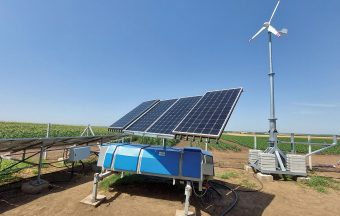Agriculture in Serbia faces significant challenges today. Climate change brings increasingly unpredictable weather conditions, while the average age of the farming population is high, and producers’ financial capacity is often limited. Added to this are problems in the organization of procurement and subsidy systems, forcing producers, especially smaller ones, to rely on their own resourcefulness and new knowledge to survive on the market.

In recent years, climate change has revealed its actual impact: prolonged droughts, heavy rainfall, hailstorms, heatwaves, and sudden frosts have become increasingly common occurrences. Traditional farming methods are increasingly unable to secure stable yields, so agriculture is gradually turning to technological solutions that can link nature and science, while at the same time safeguarding the economic interests of producers.
The Mihajlo Pupin Institute, Serbia’s leading research organization in the field of technical and technological sciences, has recognized the need to provide farmers with concrete tools to overcome the consequences of climate change. One of its most recent projects is the “Smart Garden” – an integrated system for planned irrigation and drainage of land, particularly suitable for openfield vegetable production.
How Automated Irrigation Is Changing Agriculture
The data clearly show the seriousness of the situation: in Serbia, every second year is a drought year, every third year has excessive rainfall, and only every fifth year falls within the range of the multi-year average. Moreover, rainfall patterns have changed – from March to June, there is more rain than needed, while from July to October, there is a pronounced lack of soil moisture. The “Smart Garden” was designed precisely as a response to such climate extremes.
The basic idea of the system is simple yet powerful: excess water during rainy periods is collected, stored, and utilized during droughts. Beneath the soil surface, a network of drainage pipes gathers water from the root zone of plants and directs it into reservoirs or storage basins. That water is later returned to the crops through a precise drip irrigation system or perforated hoses.
IN FOCUS:
- Fluo Varoš 1 and 2 – Construction Begins on Two Modern Solar Power Plants in Aleksinac
- WWF Expands a Network Of Hope – From Vienna To The Danube, From Schools To Forests
- How ABB Technology Redefines Industrial Energy Efficiency
What sets this system apart from conventional solutions is its full automation. The operation of drainage, pumps, and irrigation is managed by a PLC – programmable logic controller connected to sensors for moisture, temperature, and light. Based on the data collected by the sensors, the system itself decides when and how much to irrigate a given sector. An additional advantage of the “Smart Garden” is its energy independence. It is powered by a combination of a 3 kW small solar power plant and a 600 W wind turbine, which provide electricity for all key components – soil sensors, solenoid valves, control units, and water pumps. In this way, the system becomes completely energy independent, without the need for additional power sources from the grid.
There is also the possibility of liquid fertigation – the application of dissolved nutrients directly through the drip irrigation system. Nutrients are thus added in precisely controlled amounts and during the plant growth phases when they are most needed, thereby contributing to optimal growth and higher-quality yields.
The entire system is managed by MobiSun – a device that is at the same time the “brain” of the process. It not only produces electricity from solar panels but also serves as a communication hub, transmitting sensor data remotely to the farmer’s computer or mobile application. This allows the user to monitor crop conditions in real time and adjust system parameters even when not physically present in the field. A pilot project carried out in the village of Belegiš, municipality of Stara Pazova, in cooperation with the Institute of Agricultural Economics, showed that such technology delivers tangible results. The system user achieved up to 30 percent higher income on the same land area, thanks to more stable yields and reduced damage from weather extremes.
As emphasized by Prof. Aleksandar Rodić, PhD from the Mihajlo Pupin Institute, the time when smart systems were a luxury has passed – today they are a necessity for anyone who wants stable, economically sustainable, and environmentally responsible production. The “Smart Garden” demonstrates that agriculture in Serbia does not have to be hostage to weather conditions – technology can provide it with security, resilience, and competitiveness.
Prepared by Milena Maglovski
The story was published in Energy portal Magazine CLIMATE CHANGE

